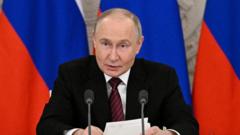In a rare late-night address from the Kremlin, Russian President Vladimir Putin put forth a call for "direct talks" with Ukraine, urging that these discussions begin "without delay, as early as 15 May." He emphasized the need for "serious talks" aimed at resolving underlying issues of the conflict and advancing toward a sustainable peace. This announcement came shortly after leaders from several European nations, including UK Prime Minister Sir Keir Starmer and French President Emmanuel Macron, visited Ukraine to press Russia for an unconditional ceasefire lasting 30 days.
Kremlin spokesman Dmitry Peskov responded to the European visit by cautioning that Moscow would need time to consider the proposal but dismissed any notion that attempts to apply pressure on Russia would be fruitful. Putin further articulated that during the proposed negotiations, he would be open to discussing the potential for new ceasefires or truces between the two nations; he mentioned his intention to confer with Turkish President Recep Tayyip Erdogan to iron out the details.
The European coalition, uniting the leaders of France, Germany, the UK, and Poland alongside Ukrainian President Volodymyr Zelensky, advocated for a month-long ceasefire to commence on the following Monday. U.S. President Donald Trump was also involved, having initially introduced the ceasefire concept. The group warned of "massive" sanctions against Russia should it reject the ceasefire proposal.
Following these discussions, Sir Keir articulated a collective demand for accountability from President Putin, stating, "If he is serious about peace, then he has a chance to show it." Zelensky also expressed gratitude for the unwavering support from the European leaders, highlighting the focus on establishing lasting security.
Later that day, Putin returned to the agenda, asserting that establishing peace was a necessity and criticizing Ukraine for its inaction regarding three previous ceasefire offers from Russia. He suggested that ongoing hostilities would undermine any prospects for peace if Ukraine continued to ramp up its military efforts. He reiterated the need for talks without preconditions, marking the resumption of negotiations nearly three years after the start of Russia's full-scale invasion into Ukraine.



















